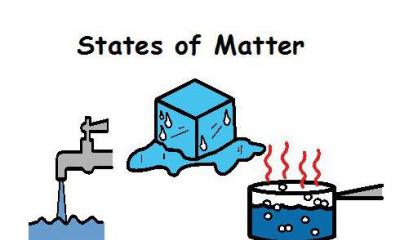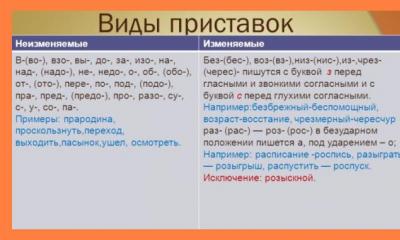Spelling prefixes is a topic that actually involves a lot of rules. These are unchangeable prefixes, and prefixes whose spelling depends on the meaning, and the use of b, etc. Our article is devoted specifically to immutable prefixes.
What types of consoles are there?
In Russian, the spelling of prefixes can depend on various factors:
- from stress (not- and ni-);
- from the deafness/voicedness of the subsequent consonant (raz-/ras-, iz-/is-, etc.);
- from the value (pre- and at-);
- for no reason, that is, it is always written the same way.
In the latter case, we are talking about unchangeable prefixes.
Conventionally, the spelling of Kommersant, as well as Y and I after consonant prefixes, belongs to this same big topic. For example, in the Unified State Examination test all these rules are combined in one task.
How to write immutable prefixes
Immutable prefixes are always written the same way. These are morphemes whose form does not depend on anything.
The same prefix can have different meanings; Let’s say the prefix za- in the word “district” has the meaning “on the other side,” and in the word “cry” it means “to begin.”
Here are examples of unchangeable prefixes:
V- (vo-)- jump up;
Outside- SUV;
You-- run out
Before-– to finish;
Behind-- spin around;
Inter-– inter-institutional;
Between-- international;
On the-- spread;
Above-– superstructure;
ABOUT-- look around;
From-– bounce off;
Ob- (ob-)- bypass;
By-- joke;
Under- (under-)- climb;
After-– aftertaste;
Pre-- offer;
Re-– jump over;
Pro-- wake up;
Pra-– great-grandmother;
C- (co-)- break;
Above-– supernatural;
U-- a trick.
Difficult cases
Most often, the spelling of the prefix s- causes difficulties. This is an unchangeable prefix; there is no prefix z. However, it is sometimes confused with prefixes like race-/time-.
But we must remember that there are words in which the letter z is part of the root: here, local, hello, no problem, etc.
Errors also occur when using the prefixes pro- and pro-. The prefix pra- has only one meaning - a long-standing ancestor. Proto-language is the ancestor of the language, great-grandmother is the mother of the grandmother, etc.
Sometimes it can be difficult to distinguish words with a prefix from words without one, or to correctly understand which prefix is in a given word. To avoid mistakes, it is necessary to highlight the root and prefix in the word. It is especially important to determine the morphemic composition of a word if a double consonant can be obtained at the junction of the root and the prefix.
For example, let's compare: used and support, input and led, counterfeit (fake) and craft (product).
But there cannot be a “triple” consonant in the Russian language, so in the word “quarrel” you get two “s”, although the sum of ras- and quarrel should be three.
What have we learned?
Immutable prefixes are always written the same way, regardless of the environment. This also applies to the prefix s-, which is written only this way, and there is no prefix s (in the words here, building, etc. s is part of the root). You need to remember the prefix pra- in the meaning of “ancestor” (“great-grandmother”). To avoid mistakes, it is necessary to determine the morphemic composition of the word.
What are unchangeable prefixes and how do they differ from changeable ones? You will find the answer to this question in the materials of this article. In addition, we will present to your attention several examples of the use of such morphemes.
general information
Before we talk about what immutable prefixes are, we should define this part of the word.
A prefix or prefix (translated from Latin praefixus means “attached in front”) is the part of the word that comes before the root. It should be especially noted that there may be several (from 1 to 3). For example: to-open, to-join etc.
Features of Russian consoles
Most prefixes in the Russian language coincide in form, and sometimes in meaning, with prepositions or particles. Here are some examples:
- roadless, that is, without a road;
- from under his brows, that is, from under the forehead;
- verbal, that is, from the verb;
- no-show- don't show up.
Types of consoles
In the Russian language there are unchangeable prefixes, changeable and foreign ones. As for the latter, they include borrowed ones, which mean:

Immutable prefixes
When studying prefixes, special attention is paid to unchangeable ones. Let's look at what this is connected with below. Now all such prefixes, as well as words with unchangeable prefixes, will be presented to your attention:

It should be especially noted that most people have great doubts about the spelling of the unchangeable prefixes s- and co-, especially in words such as here, no way, building, local, health.
The initial letter of the listed lexical units is “z”. What is this rule about? The unchangeable prefixes that were presented above are called such for a reason. After all, they are written uniformly, regardless of their sound in one position or another. And, as you dared to notice, the prefix z- is not among them. And, in general, such a prefix does not exist in the Russian language. This is confirmed by the fact that in the words here, no way, building, local And health the letter “z” is included in the root, and is not a prefix. This is why most teachers recommend memorizing their spelling rather than trying to apply any rules to them.
Let's sum it up
Now you know that a prefix that cannot be changed in writing is a prefix that is written uniformly. In other words, regardless of its position in a particular word, it must be used as described above.
If you remember all the listed immutable prefixes, then it will be quite easy for you to create literate text. After all, to correctly write these morphemes, there is no need to look for the necessary rules, select words that are as close as possible in meaning, determine a voiced or voiceless vowel, etc.

But it will take you a lot of time to remember all these prefixes. After all, there are not so few of them. To make this task easier, we recommend doing the following: each prefix that cannot be changed in writing is fixed in a separate cell of the table, which must be drawn on a separate sheet of paper. In the second column (opposite each prefix) you need to enter a couple of examples - so that they are much easier to remember. By using this table several times while creating any text, you will be able to use irreplaceable prefixes without making mistakes.
Other types of consoles
As mentioned above, in addition to unchangeable ones, there are also changeable and foreign language ones. The latter should also be remembered. This is not difficult to do, since there are not very many of them. As for changeable prefixes, in this case great difficulties arise. After all, they are subject to special rules, of which there are quite a few.
So, the variable prefixes include the following: without-/bes-, roz/ros-, vz-/s-, raz-/ras-, voz-/voz-, niz-/nis-, from-/is, through- (through-)/through-(through-). Such prefixes are called alternating “s” and “z”. How to use them while writing a letter can be understood from the following rule:

Variable prefixes also include raz-(ras-)/roz(-ros), pra-/pro-, pre-/pri-. They are subject to the following rules:
- In the prefixes raz-(ras-)/roz(-ros), the letter “o” is written in the stressed syllable, and the letter “a” is written in the unstressed position.
- In the prefixes, the letter “a” is added if there is a meaning of prescription. In other cases the letter “o” is written.
- In prefixes, the letter “e” is added if there is a meaning “through”, “very”, “in a different way”, “very” (that is, close to re-). The letter "and" is used when there is the meaning of joining, proximity, approaching, completing an action, incomplete action or accompanying action.
Console- a derivational morpheme placed before a root or other prefix ( re -do, pre -pretty, at -sea, some -Where, re -o-child).
I. The spelling of some prefixes must be remembered; they do not change under any circumstances (to carry, from carry, for carry, etc.). These same attachments include:
about-: to measure, to hew;
from-: from ruin, from cooking;
above-: over write, over beat;
under-: under the water, under the squeak;
pre-: foresee, foresee;
V-: to write, cool;
With-: with cooking, do;
re-: re-evaluate, re-entrust;
before-: up to run, before writing and etc.
At the end of prefixes there may be a running vowel o : about to vit - to mean, from to take - to take away, above the letter - must be torn, in cut - to be torn, from beat - to be torn etc.
In an unstressed prefix, the same vowel is written as under stress in the corresponding prefix of a single-root word: without gift (without dar), without sense (bes pound), for freezing (for frost), for writing (record), for buying (for buying), about flashing (about shine), about tearing (torn), according to walk (walking).
In Russian the prefix A- written only in borrowed words: A logical, A morphic.
Console pa- written in words : na vodka, pa vodka, pa vodka(specialist.); pavoloka(Old Russian "imported elegant fabric"); pa lip, pa labial, labially, na liposity(cf. related words: ruin, ruined); in other cases, only the prefix is written in -: to wander around, by watch, along the way, drive.
Console great - with the meaning “original, most ancient” is written in the words: great history, great greenery, great homeland, great Slavic, great language; great grandmother, great grandmother, great grandson, great granddaughter, great grandfather, great grandfather, great mother, great father, great parent, great granddaughter.
In other cases the prefix is written about -: about the image, about the guide, about being angry, about life, about the perspicacious.
Final consonants of prefixes, except consonant h , in writing are preserved regardless of pronunciation: throw under - jump under(although the sound [t] is pronounced in the second word), from sawing - from beat(although the second word is pronounced [d]), pre vision - premonition, to carry - to write.
Console With - does not change regardless of whether it is before a voiceless or voiced consonant: with beat, pass, do, with burn.
In words zga(in combination you can’t see anything), building, here, healthy the letter z is part of the root, it appeared as a result of the reflection in the letter of the voicing of the consonant [s]; compare: zga- from stga("way, road"), Here- from the demonstrative pronoun сь and the suffix -de-, healthy- from the prefix s- and the root -dorv ("tree"). Word building(Old Church Slavonic in origin) is formed from the verb zdati (“to build, create”) and has the same root as in the modern word architect, as well as in words create, create.
From words with a prefix re - words with a foreign prefix should be distinguished peri - , eg: peri gay, peri center(terms of astronomy), peri carditis, peri tonite(medical terms), peri osprey, peri petition, peri phrases or peri phrase(philological term; hence the verb peri phrase, but cf. re phrase‘to say, to put it differently’).
At the end of foreign language (Latin) prefixes ultra - And extra - an uncheckable letter is written A , eg. ultra revolutionary, extra ordinary, extra vert. However, in words with the Latin prefix intra - (intro - ) spellings differ with letters A And O : Wed, e.g. intra zonal, intra molecular And intro lecture, intro copy, intro vert.
II . In prefixes ending in z(s), z is written before vowels and voiced consonants, and s is written before voiceless consonants in accordance with the pronunciation: get scared, But paint.
Consoles without-, through-(from-), from-, bottom-, times-(rose-), through-(through-) are written in accordance with pronunciation: before vowels and voiced consonants (b, c, d, d, g, z, l, m, n, r) it is written h , and before the deaf ones (k, p, s, t, f, x, c, ch, sh, sch) - s: without - emergency, without - smart, once - daring; without -poor - demon -fertile, without -harmful - demon -formed, without -literate - demon -selfish; to give - to exclaim, to reward - to nourish, to cherish - to sway; from -brother - is -fill, from -vedat - is -tell; down - overthrow - down - fall; once -beating - race -laying, rose -liv - rose -writing; through - through - through - stripe, once - burn - clear - clean. Wed. also writing double consonants at the junction of prefix and root: carefree - incoherent, appeal - rebel, green - blue, jagged - cut, ring - unfasten.
In words calculation, calculating, calculate is written With , since the prefix is added to the root -even (cf.: deduction, odd, accounting, account, subtract) .
Word uncountable derived from the word count: bes-count-n-th(without counting + n; cf. demon-number).
In words calculate, calculate, calculated console dis- is added to the root -counts- (cf.: count, count, count out), which historically includes the prefix With- .
In a word quarrel two identical consonants are written, since for the Russian language the combination of three identical consonants is not typical ( races-quarrel). In words disappear, too is written s-, since historically they are formed from the roots chezati (“to disappear”) and chur (“edge, border, limit”; cf. expression: chur me), to which the corresponding prefixes are added.
Words open, gape, ruin in modern language they are non-derivative (the prefix is not isolated), so one z is written.
In the first part of complex words, the final consonant з does not change (although it is pronounced [s]), since such words are formed according to the method of merging: sitting nearby, standing nearby, from under(cf.: near + sitting, from + under); But: from the forehead, from below, is a subtish are written through s, since here the prefix is used - [iz-].
Foreign language prefixes dez-, dis- (dis-) do not depend on the quality of the consonant before which they appear in the word. The choice of one or another prefix is determined by another rule: before the vowel of the root and before z the prefix des- (diz-) is written, before the consonant - dis-: disamination, disinsection, disintegrator, disinfection, deodorization, disorientation, disjunction, disjunctive; disharmony, dislocation, disqualification, discredit, discursive, disposition.
III. In prefixes rose- (ros-) - times- (ras-) The vowels a and o are written in accordance with the pronunciation: under stress - o, without stress - a: roz given - to give, rospis - to paint, ros rash - to scatter (but: roz ysknoy, roz ysknik).
IV. After prefixes that end in a consonant, in accordance with pronunciation, Y is written instead of I:
1. Letter Y instead of AND at the root is written in accordance with the pronunciation after all Russian prefixes ending in a consonant, except for the prefixes inter- and super-: play - under -play, once -play, rose -play; go - previous; improvise - with - improvise; inventory - without inventory; indevet - about -yndevet; intellectual - to become intelligent; result - to summarize; July - pre-July(the origin of the root - Russian or foreign - is not taken into account).
2. After consoles inter- And above - vowel and does not change, since after k, h, x, w In russian language s not written: inter-institutional, over-refined; Wed also: four-needle, three-pulse.
This rule does not apply to compound words: cultural equipment, Sovinform.
In a word pick up(vz + other Russian ima-ti - “to take”), in accordance with the pronunciation, it is written and (although the prefix ends in a consonant). In related words with other prefixes, according to the general rule, y is written; compare: take away, lift up, take away(simple), but after the consonant n the vowel is preserved: take away, raise, remove.
After foreign language prefixes ending in a consonant ( dez-, counter-, pan-, post-, sub-, super-, trans- ), and does not change: disinformation, counter-play, post-impressionism(but: pre-impressionism), post-infarction (but: pre-infarction), super-intendant, trans-Iranian.
In the console from- , if it follows another prefix ending in a consonant and also goes into you : without -known (known), without -yzhod-ny (is -hod), not without -yzlishne (from -unnecessarily), also in the words sizdavna, sizmalstva, siznova.
E.A. Makovey, Russian language teacher, Municipal Educational Institution Secondary School No. 1, Adygeisk,
A.I. Arkhipova, professor of Kuban State University
§ 2. Spelling of prefixes
Console, prefix (from lat. praefixus“attached in front”) is the part of the word before the root. In Russian words, there can be from 1 to 3 prefixes before the root: tremble, join, open. Most Russian prefixes coincide in form and partly in meaning with prepositions (bezdorozhny - without a road, verbal - from the verb, from below, from under the forehead - from under the forehead), particles (not appearing - not to appear). Among the prefixes of the Russian language there are a number of borrowed ones: A in the meaning of “not”, anti - “against”, archi - “very”, counter - “against”, pan - “all”, sub - “under”, trans - “through” and etc.
2.1. Spelling of immutable prefixes
Most prefixes in Russian are unchangeable, i.e. Regardless of the sound in one position or another, they are written uniformly. The spelling of such prefixes should be remembered. For a list of unchangeable prefixes, see the table:
|
called out, stop, sediment, go numb |
||
|
get there, get there, guess |
||
|
belief, courtyard, cut, rely |
||
|
boil, gap, trick, grow |
||
|
In a special meaning: (meaning of kinship) great-grandmother, proto-language |
||
|
attack, cover, overtake |
||
|
wonder, prisoner, pick up, hammer |
||
|
OVER- (NADO-) |
bite, crack, inscribe, tear |
|
|
UNDER- (UNDER-) |
melt, sharpen, suggest, wait |
|
|
OT- (OTO-) |
give away, rest, move aside, open |
|
|
OB-(OBO-) |
trim, grind, wipe, go around |
|
|
V- (VO-) |
to your heart's content, to sew in, to cling to, to involve |
|
|
PRE- |
chairman, predecessor, predetermine |
|
|
RE- |
humus, overflow, distortion |
|
|
C- (CO-) |
move
|
There is no prefix in the words: |
2.2. Spelling of prefixes in ...z - ...s
In the Russian language there are prefixes in which letters alternate Z
And WITH
:
WITHOUT- / BES- , RAZ- / RAS-, WHO- / VOS- (VZ- / VS-), IZ- / IS-, NIZ- / NIS-, THROUGH- / THROUGH- (THROUGH- / THRASS-)
In..click; walking along; ..do; burn..burn.
The choice of consonant is carried out according to the following rule:
2.3. Spelling of prefixes PRE- and PRI-
Words starting with pre- And at-, have different origins in the Russian language.
Some came from Latin. In such words the Latin prefix prae- became part of the Russian root (president, presidium, presumption, predicate, bonus, claim, applicant, prefect, precedent, preparation, presentation). The Russian language also borrowed Latin words with a root beginning with pri (priority, privilege, private).
Others are of Old Slavonic origin. They are characterized by the Slavic prefix pre-, which is often included in the modern root (obstacle, repose, advantage, beautiful). In the language, these words retain their bookish character.
Finally, many words with pre- And at- are actually of Russian origin.
It is clear that it is impossible to draw up a clear rule for all cases. Therefore, the spelling rule proposed below is suitable mainly for words in which the meaning of the prefix is clearly guessed.
|
Let's remember some cases: |
|
|
give shape, shine
|
betray a friend, dreams
|
2.4. Spelling of vowels in the prefixes NE- and NI- in
indefinite and negative pronouns,
pronominal negative adverbs.
Note.The rule applies to words of other parts of speech if they are formed from negative pronouns and adverbs: idleness, insignificant, worthless, worthless, draw.
2.5. Spelling of consonants at the junction of prefix and root.
Pere + skaz = retelling (-s-)
ras + skaz = story (-ss-)
race + quarrel = quarrel (-ss-)
Remember:calculation (calc + even), but: calculate (calc + count);
uncountable (bes + s + even).
In words to tear apart, to tear apart, to ruin one 3 is written.
Prefixes PRE and PRI
If it matters VERY
very large - very large, exaggerate - greatly increase, etc.
If it matters PERE
break the law (transgress), transform (change appearance)
If denotes proximity, coming together or joining
nail, adjacent, bring, approach
In case of incomplete action
ajar, burn, touch
If the action is complete
dampen, invent, look after
Performs an action in someone else's interests
save, hide
Words must be distinguished
Words to remember
Roots with alternating
vowels can be divided into 4 groups:
1 group. It includes roots, the spelling of the vowel in which depends on the STRESS:
· -gor-, -gar-; -clone-, -clan-; -tvor-, -tvar- (write O without emphasis);
· -zor-, -zar-; -pilaf-, -float- (write A without emphasis)
Remember EXCEPTIONS:
utensils, residues, dross, scorch, blaze, zoryanka, swimmer, swimmer, swimmers, quicksand
2nd group. It includes roots, the spelling of the vowel in which depends on the CONSONANT AT THE END OF THE ROOT:
· -lag-, -false-;
· -jump-, -jump-;
· -growing-, -growing-, -growing-
Remember EXCEPTIONS:
polog, Rostov, Rostislav, rostock, moneylender, growth, for growth, teenager, industry, jump
3rd group. It includes roots in which the spelling of the vowel depends on the SUFFIX A:
· -lozh-, -lagA-;
· -kos-, -kasA-;
· -ber-, -birA-; -der-, -dirA-; -brilliant-, -bristA-; -ter-, -tyrA-; -per-, -pirA-; -mer-, -mirA-; -steel-, -steelA-; -burned-, -zhiga-; -even-, -read-; -nimA-, -minA-, -pressA-
· -minA-, -nimA-, -pressA-, -chinA-
Remember EXCEPTIONS:combine, combination, couple
4th group. It includes roots, the spelling of the vowel in which depends on the LEXICAL MEANING of the root:
· -equal- (= equal, identical), -equal- (= even, smooth);
· -mac- (= immerse in liquid), -mok-, -moch- (= become wet)
Remember EXCEPTIONS:
peer, level, equal, plain, equal, equal



Unchangeable prefixes. Theory
1.Most prefixes in Russian are immutable, i.e. regardless of the sound in one position or another, they are written uniformly.
The spelling of such prefixes should be remember.
List For unchangeable prefixes, see below:
O-: called out, stop, sediment, go numb
U-: ran away, left, calm down
TO-: get there, get there, guess
PO-: belief, courtyard, cut, rely
PRO-: boil, space, trick, grow
PRA-: In a special meaning: great-grandmother, proto-language
NA-: attack, cover, overtake
FOR-: ask, prisoner, pick up, score
OVER- (NADO-): bite, crack, inscribe, tear
UNDER- (UNDER-): thaw, undermine, prompt, wait
OT- (OTO-): give away, rest, move away, open
OB-(OBO-): trim, grind, wipe, go around
V- (VO-): to your heart’s content, to sew in, to cling to, to involve
YOU - pacing, exit, jumped out
PRE- (PREDO-): chairman, predecessor, predetermine, warn
OVER-: humus, overfill, distortion
C- (CO-): move, bend
2.In some immutable consoles it may happen STUN or VOICE consonant.
STUN is the replacement of a voiced consonant that is paired in terms of voicedness and deafness with a voiceless consonant.
For example: in the word TOCHETIZE, the voiced consonant B in the prefix OB- produces a dull sound P, that is, the consonant is DEAFED.
VOICE is the replacement of a voiceless consonant that is paired in terms of voicedness and deafness with a voiced one.
For example: in the word MAKE, the voiceless consonant S in the prefix S- gives a voiced sound Z, that is, the consonant is VOICED or in the word DROP, the voiceless consonant T in the prefix OT- gives a voiced sound D.
3. STUN or SONIC may occur NOT IN ALL immutable prefixes, but only in the following:
Consonant at the end of the prefixes B-, NAD-, POD-, OB-, PRED- STUNNED only if it is followed by a voiceless consonant;
Consonant at the end of the prefixes OT-, S- VOICED only if it is followed by a voiced consonant.
5) In prefixes ending in Z and S, the spelling of the final consonant depends on the pronunciation:
in front of the deaf pronounce [s] with consonants and write “s”,
before voiced ones pronounce [z] with consonants and write “z”.
For example: RAS-SAW (P - deaf), RAZ-WAK (B - voiced).
Necessarily learn prefixes that end in Z-S:
Without-, without-
Voz-, voz-
Sun-, sun-
From-, from-
Down-, down-
One-, one-
Rose-, grown-
Through-, through-
Now let's look at what errors can be allowed when performing task A6:
Error 1. If after a prefix ending in Z-S there is a vowel or Ъ, then neither the vowel nor Ъ affects the spelling of this prefix, because Z or S is heard clearly in this case.
Example words can serve this purpose Find out And Nuclear-free.
Error 2. Spelling of the prefix C- in words does not depend from the voicedness or deafness of the consonant that follows it. The prefix C- belongs to the group of unchangeable prefixes.
For example, in the words MAKE and JUMP the same prefix C- is written, despite the fact that in the first word after the prefix there is a voiced consonant, and in the second there is a voiceless consonant.
Error 3. The prefix Z-S may not be noticed if the word has two prefixes.
For example, in the word UNDEMANDED after the prefix NE- there is a prefix VOS-, the spelling of which depends on the deafness of the consonant following it.
Error 4. Do not confuse words with prefixes ending in Z-S with words whose roots are consonant with these prefixes.
For example:
1. prefix BES- (BESNOOK) and root -BES- (Besya)
2. prefix NIZ- (NIZ) and root -NIZ- (LOW)
3. prefix RAZ- (BREAK) and root -RAZ- (STARKING), root -DIFFERENCE- (DIFFERENCE)
4. prefix RAS- (GRIND) and root -RAST- (PLANT)
5. prefix ROZ- (ROZdal) and root -ROZ- (PINK)
6. prefix ROS- (ROScherk) and root -ROS- (ROSisty), other roots (ROSKOSHNY, ROSTOK)
7. prefix WHO- (Abstain) and root -WHO- (CARIO)
6)
Spelling NOT with different parts of speech.
| Part of speech. | Apart. | Together. |
| 1. Noun. | There is a contrast with the conjunction “a” ( not the truth, but a lie). | 1. Not used without NOT ( slavenot true = lie). |
| 2.Full adjectives. Short adjectives. Adverbs ending in -O, - E. | 1. There is a contrast with the conjunction “a” ( not truthful, but deceitful; not truthful, but deceitful; not truthful, but deceitful). 2. There are words ahead: not at all... not at all... not at all... far from... never... nothing... not at all... ( not a true story at all). | 1. Not used without NOT ( rainy, rainy). 2. Can be replaced with a synonym without NOT ( untruthful=deceitful, untruthful = deceitful, untruthful = deceitful). |
| 3. Full participles. | 1. The participle has a dependent word (not resolved by me). 2. There is a contrast with the conjunction “a” ( unsolved, and a decommissioned example). | 1. Not used without NOT ( perplexed). 2. There is no dependent word ( unsolved example). 3. There is no opposition with the conjunction “a”. |
| 4. Short participles. | Always separate: the story has not been read, the field has not been plowed, notebooks not checked. | _________________________ |
| 5. Verb. | 1. It is NOT written separately with a particle if used without it ( there was no, I couldn’t). | 1. Verbs that are not used without NOT ( hate, resent) 2. UNDER... (less than one hundred percent completed, less than normal: not enough points, not enough colors). |
| 6. Participle. | With the particle NOT written separately if used without NOT : without knowing, without thinking . | Participles that are not used without NOT are written together: hating, raging, indignant, perplexed . |
| 7) Spelling of unpronounceable consonants If there are several consonant sounds in a row in a word (for example, in the word HONEST - STN, ENVY - STL, AGENCY - NTSTV, etc.), then one of them may not be pronounced. This sound is called an UNPROUNDABLE CONSONANT. To find out whether a word has an unpronounceable consonant, you need to try to find a word with the same root in which this consonant is pronounced. Typically, this requires that the consonant being tested be before a vowel (HONEST - HONEST) or at the end of a word (CRUNCH - CRUNCH). Let's consider as examples the words STAR(?)NYY, HONEST(?)NYY, TERRIBLE(?)NYY and DANGEROUS(?)NYY. You can make sure that in the word STAR you need the letter D between the letters Z and N using the test word STAR. In it, this consonant sound is heard very well, since it is followed by a vowel sound - A. The word CHES(?)NYY can be checked with the word HONOR, in which the consonant T appears at the end of the word. The word DANGEROUS is checked using the word DANGEROUS: it turns out that there is no unpronounceable consonant in this word. For the adjective TERRIBLE, the word HORROR (the end of the word) or HORRIFY (position before the vowel) can serve as a test. Both test words indicate that this word does not contain an unpronounceable consonant and there is no need to write “extra” letters. In addition, you need to remember a few words that cannot be verified. Their spelling should be learned. WRITTEN WITHOUT UNPRONOUNCABLE CONSONANTS 1. Contrary to verification, the words SHINTER (although SHINE), FLASK (although GLASS), ANGRY (although ANGRY), TABLECLOTH (although TABLECLOTH) are written without unpronounceable consonants. 2. Without unpronounceable consonants, the unverifiable words are written: PROGRESS, VAST, PEER, GLOSSY. 3. The word INDEPENDENT is written without an unpronounceable consonant, meaning “backward, gravitating towards the strict, habitual” (inert beliefs). WRITTEN WITH UNPROUNCABLE CONSONANTS 1. Contrary to verification, the word LADDER (although LADDER) is written with an unpronounceable consonant. 2. The unverifiable words FEELING, PEER are written with an unpronounceable consonant. 3. The word BONE is written with an unpronounceable consonant, derived from the word BONE (bone marrow, bone tissue). |








